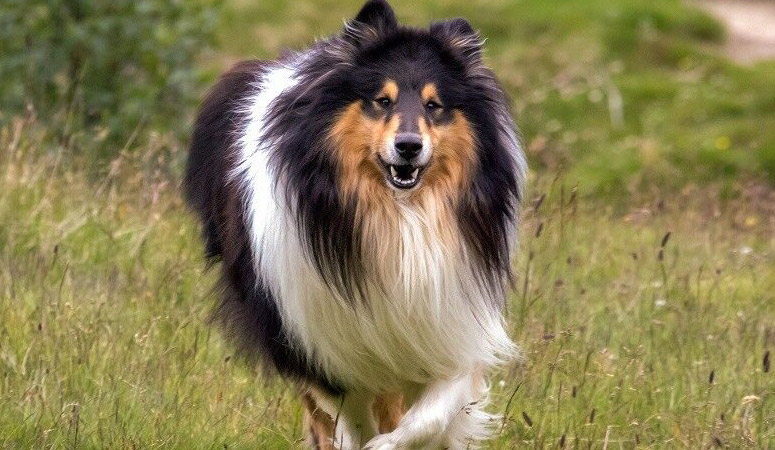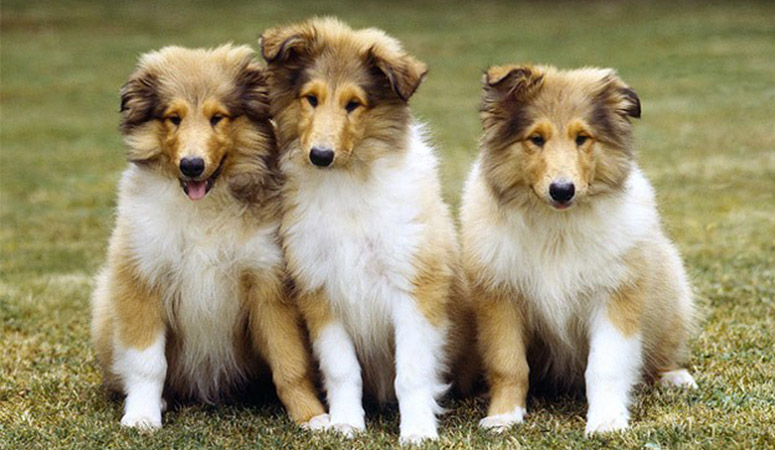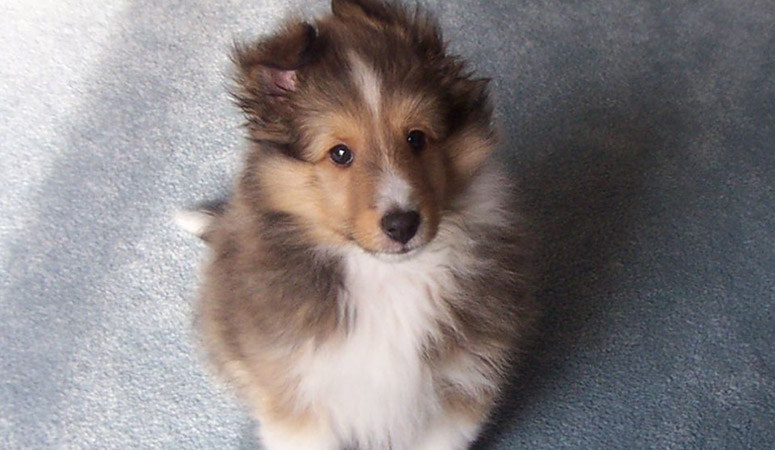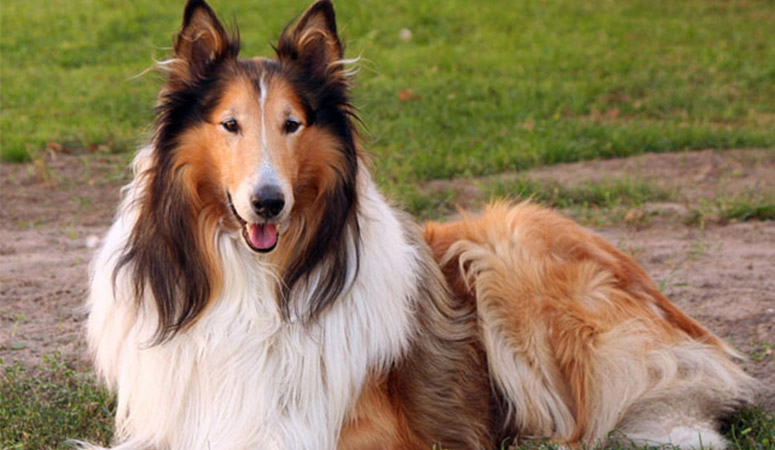Collie
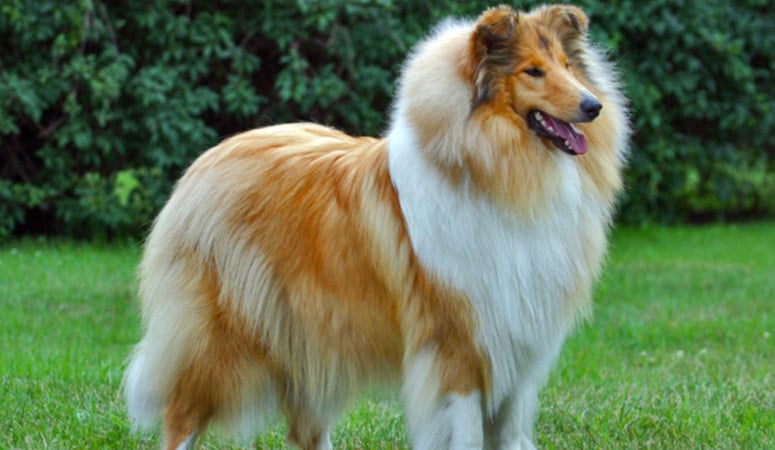
The Collie is an active, lithe, strong dog that combines strength, speed, and grace. They were bred for herding sheep in Scotland, they have two types of coat. Collies may be one of the best family dogs as they are devoted to the entire family, easy to be trained, and they need little grooming.
| Other Names | Collie, Rough, Rough Collie, Scotch Collie, Scottish Collie, Smooth Collie |
| Color | Black, Black and Tan, Red, White |
| Height | Males: 22-26 inches. Females: 20-24 inches. |
| Weight | Males: 45-75 pounds. Females: 40-65 pounds. |
| Life Span | 12-14 years |
| Personality | Devoted, Graceful, Proud |
| Exercise | Regular Exercise |
| Origin |
| Popularity | #38 |
| Groom Needs | 2-3 Times a Week |
| Kids Friendly | Yes |
| Dog Friendly | Yes with supervision |
| Watch Dog | |
| Family Dog | Yes |
| Litter Size | 8-12 |
Collie Pictures
Collie Video
Introduction
The Collie is the kind of dog that everyone says in their lifetime; ‘I want to have a dog like that one day’. Many thousands of people still remember the star of the famous, evergreen true movie, that of Lassie. Lassie is so typical of the real-life Collie of today; extremely intelligent, sensitive, just an all-round amazing dog! They are medium-sized, weighing around 70 pounds and standing around 26 inches at the shoulders. They are easy to train, devoted, protective dogs, with a friendly disposition – but of course always suspicious of strangers. Even though good watchdogs, they are not aggressive. They are beautiful to look at too; possessing a full coat of hair that indeed needs grooming. The Collie comes in four colors: sable (like Lassie), tricolor (black with white markings and tan shadings), blue-merle (silvery blue and black), and white (predominately white with markings). Nutritional food for this dog is a must and plenty of exercise; they bark a lot if they are bored.
Living with Collie
Both varieties of Collie have double coats. Smooth Collies only need regular grooming because they don’t mat, while during the shedding season, more frequent brushing is required. Rough Collies need attention to avoid matting and remove loose undercoat, especially in certain areas such as behind the ears and elbows. A weekly brushing down to the skin can help this problem and keeps the coat and skin healthy.
Collies need a bath about once a month unless they get messy in the yard. The owner needs to check the dog’s ear once a week for dirt, redness, or a bad odor that may indicate an infection. Also, brush their teeth at least once a week to keep fresh breath and prevent gum disease. Besides, trim the nails once a month if your dog doesn’t wear down its toenails naturally.
Generally, Collies generally are quite active and require regular exercise but there are disparities of individuals and families. Once Collie gets enough exercise they can live comfortably in the city or the country. A long walk, good run, or energetic play session every day are good options. Besides, if you want your dog in good shape, jogging is better, as well as at least a couple of vigorous exercise during the week, such as fetch, dog park, training session. And games and tricks could provide mental exercise that the dog needs.
If left alone for too long, Collie may tend to bark excessively. Letting the dog join in all family activities and keeping its mental challenged with ongoing obedience training or dog sports.
Many breed experts suggest that Collies should not be fed foods with corn or soy in the ingredients. They have a risk of bloat, so split the food into two meals is recommended, and add some meat to the food could reduce the risk. The owner needs to know that good nutrition is very important to ensure healthy skin and coat, and general well-being. Mostly, it is recommended to feed a Collie with two to three cups of high-quality dry dog food every day, divided into two meals. More importantly, the food amount should depend on the dog’s weight, size, age, and activity level. There should be fresh and clean water at all times.
Some dogs are easy to get overweight, so you need to watch their calorie consumption and weight level all the time. Treats may be an important aid in training, but excessive intake can lead to obesity. Also, owners need to distinguish which human food is safe for dogs and which are not. If you have any problems with your dog’s weight or diet, just consult from your veterinarian.
Collies are prone to the following health condition: eye and eyelid disorders (Collie Eye Anomaly), skin disorders, nasal solar dermatitis, hip dysplasia, progressive retinal atrophy, congenital ectopic ureters, bloat, congenital deafness, elbow luxation…
Major concerns: none
Minor concerns: gastric torsion, CEA, dermatomyositis, PRA, demodicosis
Occasionally seen: microphthalmia, seizures, cyclic neutropenia, CHD
Suggested tests
MDR1 DNA Test
PRA Optigen DNA Test
Total Annual Cost: $2889
Cost is estimated for the first year and may vary depending on many factors, such as dog food, health care, leash, collar, licensing, possible fencing, crates, training and obedience classes, dog-walking, grooming, treats, toys, flea, tick, and heart-worm meds, microchips, etc.
Collies are very smart and easy to train, but it is recommended to start sessions for general socialization and training as early as possible. They enjoy training and learning, and this makes the dog be a better companion and set up a good relationship with the owner and family. The proper socialization can help the puppies to develop an outgoing and friendly personality that is characteristic of the breed.
Besides, Collies can excel in obedience, agility, and herding, and even barn hunt and lure coursing, the owner could find something interesting to do with their great companions.
History
The Collie originates from Scotland, primarily from the Highland regions.
Some historians believe that the name Collie comes from the Scottish black- faced sheep that the dog used to guard so much in earlier years because the word Collie is the Anglo-Saxon word for ‘black’. Others say that the Collie’s ancestors were brought to the British Isles by some Roman conquerors, at least 2000 years ago.
William Secord, an author, says that the Collie was originally introduced to England by shepherds that brought their flocks over the borders. By 1895, there were seven breed clubs. What was once a rough and ready working-dog became, by 1896, a refined and elegant show-dog.
Queen Victoria loved all animals, but she particularly loved the Collie. She had a sheep farm on her estate at Balmoral. Sharp was the name of her favorite collie. The Queen’s loyalty to the Collie was enough to catapult it into prominence in the show ring, even though she was not a major exhibitor.
In 1879 the first English Collie was imported to the USA. It was from England that American fanciers sought their big winner and a good foundation for future stock. The Collie Club of America started in 1886, making it one of the oldest American specialty clubs in existence. The Collie was recognized by the AKC in 1885.
Today, the Collie ranks around 36th in popularity at the American Kennel Club.
Helpful Information
Breed Club: COLLIE CLUB OF AMERICA, INC.
Breed Club Link: http://www.collieclubofamerica.org/
Breed Club Rescue:
Breed Club Rescue Link: http://www.collieclubofamerica.org/17/collie-rescue-groups.pdf

